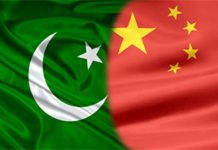BEIJING: The novel coronavirus disease (COVID-19) has not only affected the economies of countries and regions but also poses a challenge to the United Nations Sustainable Development Goal (SDG) of ending poverty by 2030.
October 17 was a poignant reminder of that. It is the UN International Day for the Eradication of Poverty, which began to be observed 27 years ago. The theme this year was acting together to achieve social and environmental justice for all.
The year 2020 is crucial for China, which has to meet the twin goals of building a moderately prosperous society in all respects and eliminating absolute poverty by the end of the year. Though hit by COVID-19, China’s poverty alleviation goal is anticipated to be met, which will mean China can achieve the first of the 17 SDGs of the UN 2030 Agenda for Sustainable Development 10 years ahead of schedule. It will also become the first in the world to end absolute poverty, which will have a significant impact on the rest of the world.
“I am confident of achieving the goal of poverty eradication this year,” President Xi Jinping said during an inspection tour in Ankang in Shaanxi Province, northwest China, in April.In the past four decades since reform and opening up began in 1978, China has lifted 850 million people out of poverty.
At the end of 2019, the number of the rural poor in China fell to 5.51 million from 98.99 million in 2012.
Fabrizio Hochschild Drummond, special adviser to UN Secretary General António Guterres, highlighted China’s achievements in poverty reduction in a recent interview, saying, “China’s own national success in reducing poverty accounts for a very large part of the global poverty reduction over the past decades. I think there’s much that can be learned from what was achieved by China. And I think many other countries are trying to learn.”
While a vaccine for COVID-19 is still being explored, China has an effective prescription for poverty.
– The Daily Mail-Beijing Review News exchange item






